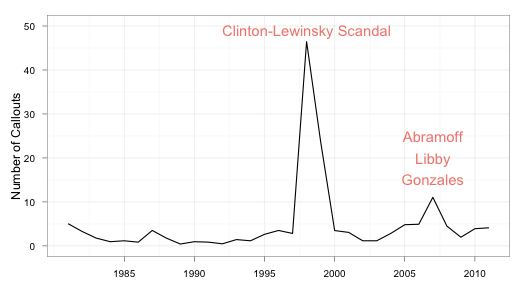Politicians Never “Lie”

With even a casually critical reading of the news, it becomes painfully clear that politicians are by and large a bunch of lying liars. They all lie, across the political spectrum, regularly traversing the lie taxonomy, from exaggerations, misleading statements, and lies by omission, to outright fabrications and even occasionally going for the Big Lie. G. W. Bush, for example, claimed that the vast majority of his tax cuts would go to the bottom end of the income spectrum. To the contrary, the non-partisan Tax Policy Center found that the wealthiest quintile reaps the biggest breaks, both in absolute and in relative terms. Obama, also distorting the consequences of his economic legislation, recently claimed his jobs bill would add far more workers than estimated by an independent group of economists.
Despite my heightened level of cynicism, I was a bit shocked by the brazenness of the lie Mitt Romney — the front-runner for the republican presidential nomination — tells in his latest campaign commercial. In the ad, Obama is heard saying, “If we keep talking about the economy, we’re going to lose,” suggesting admission of a failed economic policy. While Obama did in fact utter those words during the 2008 presidential campaign, his full statement was: “Senator McCain’s campaign actually said, and I quote, ‘If we keep talking about the economy, we’re going to lose.’” Romney’s advisors are unrepentant, lambasting complaints as being “hysterical”. (Ironically, Obama’s original statement was itself deceptive. The quote was from an unnamed McCain strategist, and was not, as Obama suggests, a publicly stated position of the “campaign”. It’s hard to keep up with the layers of lies!)
Once we’re happy to disregard context, it opens up a whole brave new world of possibilities. Why stop at cherry picking phrases? Let’s just take a person’s words and rearrange them into whatever order we want. In fact, is there really anything sacred about words — let’s break it down to phonemes! Well, before we venture down that rabbit hole, maybe we should go to the source himself and hear what Romney has to say. So Mitt, what do you make of this whole situation — do you have any regrets?
Play Me
(The Romney remix above was pieced together from another of his inspirational campaign commercials.)
Without absolving the liars themselves, this dismal state is at least in part attributable to journalists that are loath to call a spade a spade. Sifting through the last 30 years of New York Times articles,[1] I typically found only a handful of political stories each year that explicitly characterized a statement to be a “lie”. The Romney fib was not among them. (To his credit, Ryan Lizza at The New Yorker did use the L word in calling out Romney.) The Times kicked it into high gear for Monicagate, and managed to muster a bit of interest in the trifecta of back-to-back lies by Abramoff, Libby, and Gonzales. The vast majority of these “liar” articles, however, are either opinion or “he said, she said” pieces, which do not definitively establish a proclamation to be a lie. The remaining articles primarily report on self-admissions of lying (e.g., Weiner), or lies as determined by a court (e.g., Libby). In short, over the last three decades, there are hardly any instances of reporters at the New York Times — one of the most reputable papers in the world — independently calling out lying liars on their lies.

“A core function of the media is to separate fact from fiction”
One could argue that objective reporting prohibits journalists from verbally attacking their subjects by calling them liars. I think that’s a difficult position to defend. A core function of the media is to separate fact from fiction, to evaluate and challenge statements made by political players so as to present an accurate and complete story to readers. If not, then soon we’ll be reduced to nothing more than our phonemes.
Bonus Puzzle
Consider a hypothetical voting system for deciding between candidates A and B. The population is divided into states, and each state holds its own election between the two candidates. Then the “real” election is held with each state getting a number of votes proportional to its population. Assume that every state casts all of its votes for the candidate that got the majority in the state election. It turns out to be possible, under such a system, for the loser in the real election (the electoral college) to have received a majority of the total votes (the popular vote).
What is the greatest possible percentage of the popular vote that the loser could get, and still lose in the electoral college?
(No real world data is needed to answer this.)
Footnotes
[1] With the New York Times API, all U.S. political stories were pulled in which the word “lie” (in any grammatical form) was used along with at least one other word indicating deceit (e.g., “untruth”, “misleading”, etc.). By inspecting a random sample of these articles, I determined that approximately half detailed a specific lie (as opposed to lying in abstract terms, or used in an entirely different manner, as in “lie down”), from which yearly callouts were then estimated and plotted.
Illustration and Romney remix music by Kelly Savage. Thanks to Dan Reeves for comments, and for keeping me honest.
